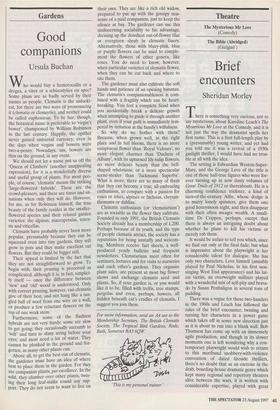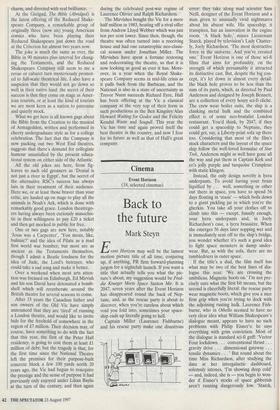Theatre
The Mysterious Mr Love (Comedy) The Bible (Abridged) (Gielgud )
Brief encounters
Sheridan Morley
There is something very curious, not to say mysterious, about Karoline Leach's The Mysterious Mr Love at the Comedy, and it is not just the way the dramatist spells her first name. This is a first full-length play by a (presumably) young writer, and yet had you told me it was a revival of a 1930s gaslight thriller, I would have had no trou- ble at all with the idea.
The setting is Edwardian Weston-Super- Mare, and the George Love of the title is one of those half-true figures who were for- ever turning up in now dusty volumes of Great Trials of 1912 or thereabouts. He is a charming confidence trickster, a kind of turn-of-the-century Alfie, whose dodge is to marry lonely spinsters, give them one good honeymoon night, and then disappear with their often meagre wealth. A small- time Dr Crippen, perhaps, except that there is always an intriguing doubt about whether he plans to kill his victims or merely rob them.
It would be unfair to tell you which, since we find out only at the final fade; but what is impressive about the playwright is her considerable talent for dialogue. She has only two characters, Love himself (amiably played by Paul Nicholas, in his first non- singing West End appearance) and his lat- est victim, an overweight milliner played with a wonderful mix of self-pity and brava- do by Susan Penhaligon in several tons of padding.
There was a vogue for these two-handers in the 1960s and Leach has followed the rules of the brief encounter, twisting and turning her characters in a power game which takes off in some new direction just as it is about to run into a blank wall. Bob Thomson has come up with an immensely agile production, and though in its slower moments one is left wondering why a con- temporary playwright would wish to return to this moribund snobbery-with-violence convention of dated fireside thrillers, there's no doubt that as an exercise in the drab, boarding-house dramatic genre which kept many regional and repertory theatres alive between the wars, it is written with considerable expertise, played with great charm, and directed with real brilliance.
At the Gielgud, The Bible (Abridged) is the latest offering of the Reduced Shake- speare Company, a remarkable group of originally three (now six) young American comics who have been playing their Reduced Shakespeare just down the road at the Criterion for almost two years now.
The joke is much the same as ever, the Bible in 90 minutes plus interval for chang- ing the Testaments, and the Reduced Shakespeare Company still seem to me a revue or cabaret turn mysteriously promot- ed to full-scale theatrical life. I also have a suspicion that they would not go down so well in their native land: the secret of their success is that they come on stage as Amer- ican tourists, or at least the kind of tourists we are most keen as a nation to patronise and quietly mock.
What we get here is all known gags about the Bible from the Creation to the musical of Armageddon, written and performed in cheery undergraduate style as for a college celebration. The fact that the Company is now packing out two West End theatres, suggests that there's demand for collegiate humour unsatisfied by the present educa- tional system on either side of the Atlantic.
All the old jokes are here, from fig- leaves to such old groaners as 'Denial is not just a river in Egypt', but the secret of the alternative RSC's success has always lain in their treatment of their audience. Here we, or at least those braver than your critic, are hauled up on stage to play all the animals in Noah's Ark, which is done with remarkably good grace. London theatrego- ers having always been curiously masochis- tic in their willingness to pay £20 a ticket and then get mocked in public for free.
One or two gags are new here, notably `Jesus was a Carpenter', 'You mean, like, bulimic?' and the idea of Pilate as a mad first world war bomber; but most are as ancient as the Testaments themselves, though I admit a Beatle fondness for the idea of Jude, the Lord's betrayer, who could take a sad song and make it better.
Over a weekend when most arts atten- tion was focused on Edinburgh, Ed Mirvish and his son David have detonated a bomb- shell which will reverberate around the British theatre for several seasons to come.
After 15 years the Canadian father and son owners of the Old Vic have simply announced that they are 'tired' of running a London theatre, and would like to invite bids for the freehold of somewhere in the region of £7 million. Their decision may, of course, have something to do with the fact that this year, the first of the Peter Hall residency, is going to cost them at least £1 million of debt; but the tragedy is that, for the first time since the National Theatre left the premises for their purpose-built concrete block a few 100 yards north 20 years ago, the Vic had begun to reacquire the prestige and the sense of purpose it had previously only enjoyed under Lilian Baylis at the turn of the century, and then again during the celebrated post-war regime of Laurence Olivier and Ralph Richardson.
The Mirvishes bought the Vic for a mere half million in 1983, beating off a rival offer from Andrew Lloyd Webber which was just ten per cent lower. Since then, though, the theatre was often turned into a receiving house and had one catastrophic neo-classi- cal season under Jonathan Miller. The Mirvishes have spent a fortune restoring and redecorating the theatre, so that it is now looking as good as ever it has. More- over, in a year when the Royal Shake- speare Company seems in mid-life crisis as it pulls back from the Barbican, and the National is also in a state of uncertainty as Trevor Nunn succeeds Richard Eyre, Hall has been offering at the Vic a classical company at the very top of their form in such productions as the Ben Kingsley/Alan Howard Waiting for Godot and the Felicity Kendal Waste and Seagull. This year the Vic has time and again proved itself the best theatre in the country, and now I fear for its future as well as that of Hall's great company.



























































 Previous page
Previous page